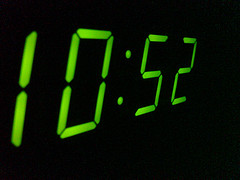Posts Tagged ‘sleep’
Daily Smart Fact #32: Why You’re Fattest at Night and Skinniest in the Morning
 Takeaway: You lose more than a pound every night from breathing. That’s because you breathe in oxygen (O2) and breathe out carbon dioxide (CO2 – two oxygen atoms plus a carbon atom), “so there’s an extra carbon atom leaving in every round trip.”
Takeaway: You lose more than a pound every night from breathing. That’s because you breathe in oxygen (O2) and breathe out carbon dioxide (CO2 – two oxygen atoms plus a carbon atom), “so there’s an extra carbon atom leaving in every round trip.”
I like weighing myself. Call it my own personal body experiment, but I enjoy seeing the fluctuations of my weight throughout the day – in the morning, after I eat, before/after I go to the restroom, right at night. It might sound obsessive, but I’m not trying to lose weight – it’s just fascinating to observe the fundamentals of input/output on your own body. Eat a POUND of cheese? Yeah, you’ve just gained an immediate pound. Drink 24 oz of water? Yeah, you just gained 24 oz. on that scale.
Anyway, I stumbled upon a neat article that my friend (hi Li!) posted on Facebook and found it intriguing: Every Night You Lose More Than a Pound While You’re Asleep (For the Oddest Reason). Basically, this guy records himself over a couple of days weighing himself at night and then again in the morning, wearing the same clothes. He interviews people and eats hamburgers and goes to the bathroom, fun stuff. Not the most rigorous scientific experiment. But his finding at the end is that, just breathing at night, thousands of breaths over a typical 8-hour sleep, results in us losing about a pound or more just from the extra carbon that gets expelled.
Daily Smart Fact #5: Your alarm clock may be the culprit for your bad night of sleep
 Key Takeaway: Tiny light rays from a digital alarm clock can be enough to disrupt the sleep cycle even if you’re not fully awake.
Key Takeaway: Tiny light rays from a digital alarm clock can be enough to disrupt the sleep cycle even if you’re not fully awake.
I had a bad night of sleep last night. When I was younger and even through my college days, I slept like the dead. My first trip back home for the winter holidays after my finals is a perfect example of that. I fell fast asleep in my seat on the plane shortly after take off. An hour later, I woke up only to find out that we were back on the tarmac. Confused, I asked my neighbor what was going on. The man was incredulous “you slept through that?” It turned out that there were some engine problems and we had to land back down. The engines were screaming so loudly, my neighbor said he had to plug his ears with his hands. Yup, I slept through that whole episode.
Nowadays, I can wake up from a pin drop. We have blackout shades in our room because the light disrupts our sleep. So I decided to learn more about how sleep works and what the cause could be for a restless night. Here’s some facts I found from The National Sleep Research Project.
- Tiny luminous rays from a digital alarm clock can be enough to disrupt the sleep cycle even if you are not fully awake. The light turns off a “neural switch” in the brain, causing levels of a key sleep chemical to decline within minutes.
- To sleep, our body temperature needs to drop off. Body temperature and the brain’s sleep-wake cycle are closely linked. that’s why hot summer nights can cause a restless sleep. The blood flow mechanism that transfers core body heat to the skin works best between 18 and 30 degrees. As you get older, the comfort zone shrinks to between 23 and 25 degrees – one reason why older people have more sleep disorders.
- Some studies have shown that women need up to a hour of extra sleep than men, and not getting it may be one reason why women are more susceptible to depression than men.
- A new baby typically results in 400-750 hours of lost sleep for parents in the first year (YIKES!)
- Anything less than 5 minutes to fall asleep at night means you’re sleep deprived. You should ideally take 10 to 15 minutes to fall asleep.